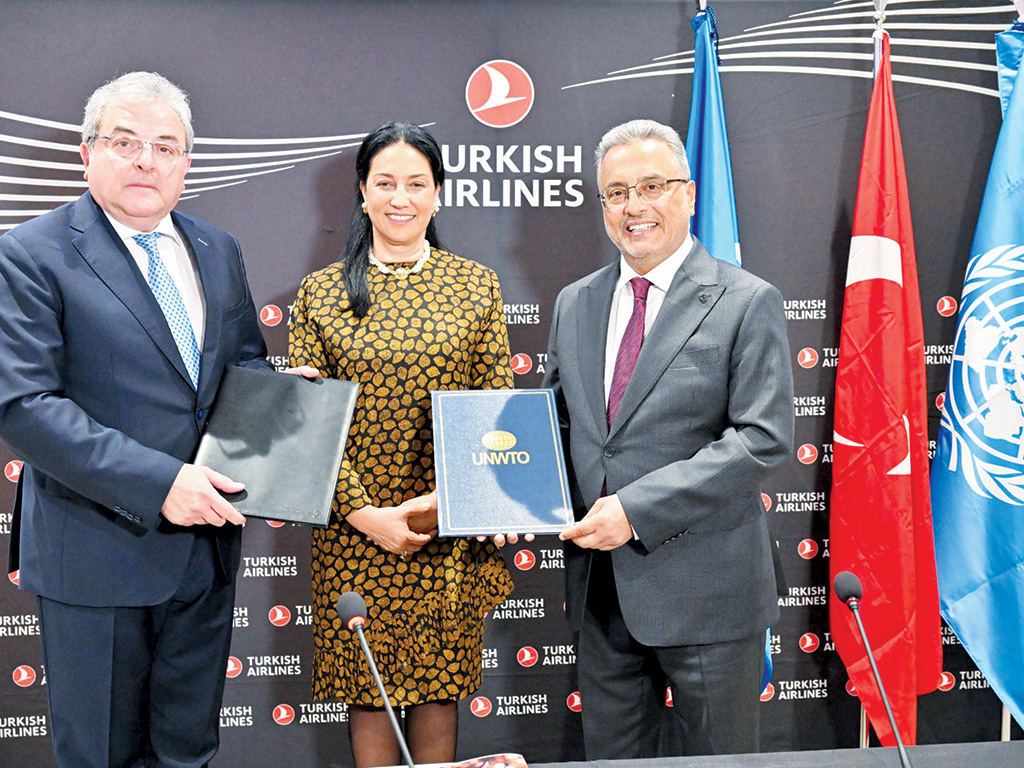Sustainability may be a buzzword these days, but for Turkish Airlines, it’s more an ethos.
Recently, the flag carrier of Turkey launched a sustainability brand called Tomorrow On-Board at Istanbul Airport, where its in-flight products and services, along with items made of repurposed aircraft parts, went on display.
Chief Investment & Strategy Officer of Turkish Airlines, Levent Konukcu, said at the time of the launch: “Tomorrow On-Board initiative embodies our commitment to reducing our environmental impact and enhancing sustainability practices across all our operations to leave a better world for future generations.
“Through this platform, we emphasise our dedication to offering transparent information and data, ensuring that our sustainability efforts are consistently clear and easily accessible to all stakeholders.”
If you look at the last 20 years, our average growth rate was around 12.3 per cent, almost three times more than IATA’s average
– Ahmet Bolat
This need to connect with customers has kept the brand’s name flying high. “Last year, Turkish Airlines carried more than 83 million passengers. This year, we expect to carry 90 million passengers. We are connecting people all over the world,” says Prof. Ahmet Bolat, Chairman of the Board and the Executive Committee of Turkish Airlines, in an interview with TTN Middle East.
Turkish Airline subsidiary AJet, formerly branded as AnadoluJet until March 31 this year, is also performing well, Bolat tells us. The low-cost carrier, based out of Istanbul’s Sabiha Gökçen International Airport, is expected to grow to 200 aircraft by 2033.
“We can connect passengers to their next flight in less than two-and-a-half hours,” he adds. The fleet is extensive with 455 aircraft (some of which are cargo planes) and there are plans to expand the services. “In 10 years, we are going to double it to 810 aircraft,” Bolat tells media representatives.
“If you look at the last 20 years, our average growth rate was around 12.3 per cent, almost three times more than IATA’s average.”
Turkish Airlines is a publicly listed company, of which 49 per cent is owned by the wealth fund of Turkey and the remaining 51 per cent is in the stock market. “So, there are no government subsidies. Turkish Airlines must have a sustainable business model. That’s the reason, in the last three years, we have started introducing people to the beauty of Turkey, sun and sea, or beautiful, natural, historic sights you cannot find anywhere else in the world.”
One of the initiatives that helps the airline entice clients is the complimentary stopover experience for transit passengers. Customers flying via Istanbul who have a layover are treated to tours and experiences in the Turkish capital, for free. “For the families [of passengers] and the business class passengers, transit passengers, we always looking for more opportunities to enhance our product and services,” says the Chairman.
For stopover clients not only are tours arranged depending on bent of mind and amount of time the passenger has but also stays. “You can select 20 hours transit time minimum to be eligible to stay in a hotel. Business class passengers can have two nights at a five-star hotel and the economy class passengers can enjoy one night at a four-star hotel,” he explains.
Turkish Airlines first took off in 1933 and currently flies to more than 345 cities in the world. Committed to increasing tourism, the airlines signed a MOU with The World Tourism Organisation whereby both parties aim to work closely to enhance initiatives promoting sustainable tourism and civil aviation on a global scale.
Commenting on the signing of the MoU, Bolat, said: “We are excited to set out on a journey to forge a strategic partnership with UN Tourism in order to achieve our shared objectives of promoting sustainable tourism and enhancing global connectivity. This potential partnership underscores our commitment to sustainable tourism and highlights our role as a global connector, bringing people and cultures together across the world.”
The contribution that the Turkish Airlines gets from passengers is important. “Last year, 20 million people came to visit Istanbul,” says Bolat. “Now, out of these, some were budget travellers and some came to stay in luxury hotels and put money in Istanbul. Now, what we are doing is the people who are passing through Istanbul, we are telling them, look, you are missing something by not visiting Istanbul. So, if you extend your trip one day, your hotel accommodation is from our pocket, we have this one stop Istanbul package.”

